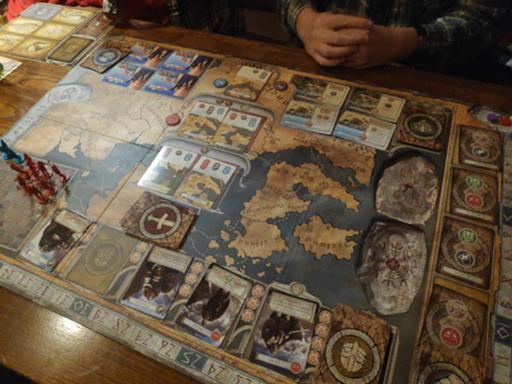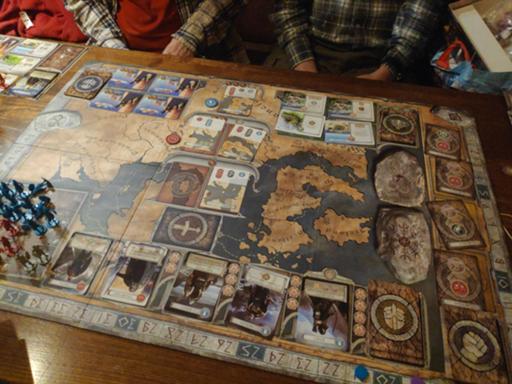This Meetup-based
boardgames group continues at the Marlow Donkey.
Just one long game this evening, In the Name of
Odin by
Krzysztof Zięba (his first published game). It's an odd beast; it
presents itself as a hand-management set-collection sort of game, in
that the cards you manipulate to get resources reward you for having
lots of a single type; but you'll need to get all the resources
sooner or later, and changing your cards is pretty easy (there's a
face-up pool that you can swap with once a turn, and other
opportunities too).

You're trying to get points. You get points mostly by going on raids
(yeah, cliché vikings rather than anything like historical ones). To
do a raid you need a hero, and a ship, and (depending on the raid
card) some number of companions of various sorts; you buy all of these
by working the action cards.
So mostly it ends up being a matter of seeing what you can get from
your hand; we usually ended up spending all our cards each turn,
because even if you want to make up a set of a particular symbol, the
benefit from holding onto just one of it is usually smaller than
spending the card now and hoping it'll show up next time. (I believe
that the chance of getting three or more of any given symbol, in a
six-card draw, is a shade under one-third.) If you don't have the
cards for a hero, you probably have the cards for a ship, and if not
that then a building, and if not that then you can recruit more
companions.
But it's mostly not engine-building: when you go on a raid, all the
prerequisites you use (heroes, companions) are lost, except for your
ship which is damaged. (Apparently you have to spend the four tokens
to bring it home and repair it, rather than abandon it at sea and
spend just three tokens to get a new one.) So it's back to the hand of
cards to slog away and build up another raiding party. You can also
buy buildings to relax some of the game's limits, which provides the
only real sense of progression apart from the score track.
Basically it's a more Eurogame version of Champions of Midgard which
has just one major point-generating activity.

Which is nothing special, but OK. The game does suffer from a lack of
reference cards (there are all sorts of standard costs that aren't
noted on the board or the player mat), and the design is very drab.
But the thematic disconnect is near-total; it doesn't feel at all
Vikingy, so one plays this for the mechanics. And a game which doesn't
have thematic gameplay needs really solid mechanical gameplay, or it
just becomes an exercise in pushing cards around. I'd play it again if
a bunch of friends got it out, but I don't think I'd ever suggest it.
Comments on this post are now closed. If you have particular grounds for adding a late comment, comment on a more recent post quoting the URL of this one.